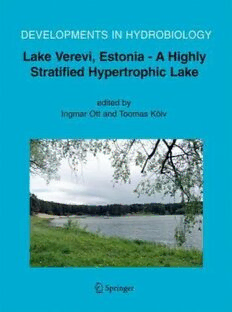
Lake Verevi, Estonia - A Highly Stratified Hypertrophic Lake (Developments in Hydrobiology) PDF
210 Pages·2005·4.368 MB·English
Most books are stored in the elastic cloud where traffic is expensive. For this reason, we have a limit on daily download.
Preview Lake Verevi, Estonia - A Highly Stratified Hypertrophic Lake (Developments in Hydrobiology)
Description:
This book summarises investigations on Lake Verevi (surface 12.6 ha, mean depth 3.6 m), located in the Estonian town of Elva, initiated since 1929. The seventeen articles deal with a wide range of questions, starting with a holistic overview of the ecological status, over assessments of long-term changes in biotic and abiotic conditions and finishing with proposed restoration plans. Abiotic chapters provide calculations on water and mass balance, distribution and fractions of phosphorus in the sediment, optical properties and penetration of radiation in the water column, sedimentation rate during the formation of stratification, and nitrogen circulation characteristics. All these phenomena explain the special environmental features of this highly stratified lake. Long-term changes, seasonal development, primary production and resource ratios inducing the distribution of species composition of various biota (bacterio-, phyto and zooplankton, periphyton, macrovegetation, macrozoobenthos, fish) are discussed. The most important issues are long-term investigations on a complex ecosystem, the phenomenon of partial meromixis, the description of restoration methods, and the existence of narrow microniches for plankton in the water column. The volume firmly establishes Lake Verevi as a model system of a natural aquatic habitat, experiencing a multitude of anthropogenic pressures, but for which restoration plans aim to provide sustainable management in the future.
See more
The list of books you might like
Most books are stored in the elastic cloud where traffic is expensive. For this reason, we have a limit on daily download.
